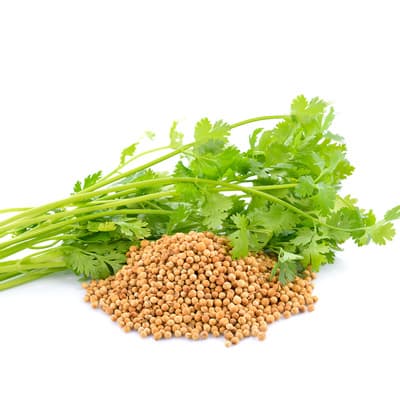
Scientific Name: Coriandrum sativum
Higher Classification: Coriandrum
Family Name: Apiaceae
Rank Name: Species
Order Name: Apiales
Kingdom: Plantae
Coriander
Published Date: 6/17/2023 5:57:25 AM
What is Coriander :
- Coriander leaves are a rich source of magnesium, manganese, iron, and dietary fiber to reduce stomach pain, diarrhea, and loss of appetite. Coriander seeds are curing different skin problems such as eczema, rashes, and inflammation. It also prevents Mouth Ulcers and Strengthens Bones. It regulates Cholesterol, Menstrual Irregularities, Diabetes, Gastric Problems, indigestion. (More Details)
How is it prepared and available :
- Coriander is an herb that’s commonly used to flavor international dishes. Many people use coriander in dishes like soups and salsas, as well as Indian, Middle Eastern, and Asian meals like curries and masalas. Coriander leaves are often used whole, whereas the seeds are used dried or ground.
What are its benefits :
- Coriander may lower blood sugar by activating certain enzymes. In fact, it’s powerful enough that people with low blood sugar should use it cautiously.
- Coriander is full of antioxidants that demonstrate immune-boosting, anticancer, anti-inflammatory, and neuroprotective effects.
- Coriander is full of antioxidants that demonstrate immune-boosting, anticancer, anti-inflammatory, and neuroprotective effects.
- Coriander may protect your heart by lowering blood pressure and LDL (bad) cholesterol while increasing HDL (good) cholesterol. A spice-rich diet appears to be associated with a lower risk of heart disease.
- The antioxidants in coriander may reduce brain inflammation, improve memory, and reduce anxiety symptoms, though more research is needed.
- Coriander may reduce unpleasant digestive symptoms like bloating and discomfort often experienced by people with IBS. It may also boost appetite among some people.
- Coriander exhibits antimicrobial effects that may help fight foodborne illnesses and pathogens like Salmonella.
- Coriander contains antioxidants that may protect your skin from aging and sun damage. It may also help treat mild skin rashes.
- Coriander seeds and leaves both come in handy for everyday cooking but offer very different flavors that determine their best uses.